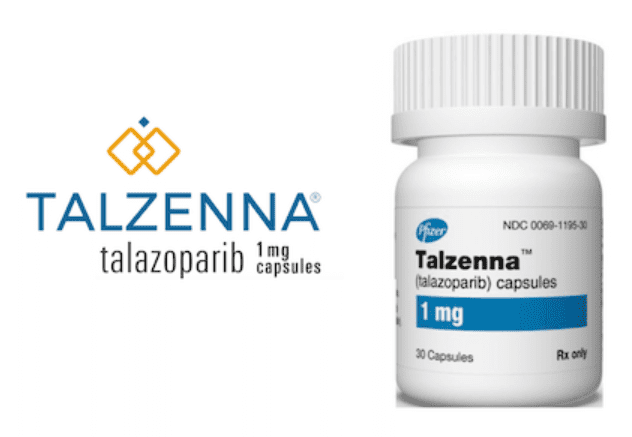Talazoparib with enzalutamide is approved by FDA for HRR gene-mutated metastatic castration-resistant prostate cancer
July 2023: The Food and Drug Administration cleared talazoparib (Talzenna, Pfizer, Inc.) with enzalutamide for homologous recombination repair (HRR) gene mutations in metastatic castration-resistant prostate cancer (mCRPC).
TALAPRO-2 (NCT03395197), a randomised, double-blind, placebo-controlled, multi-cohort study with 399 patients with HRR gene-mutated mCRPC, looked at how well the drug worked. The patients were given either enzalutamide 160 mg daily plus talazoparib 0.5 mg daily or a dummy every day. Patients had to get an orchiectomy first, and if that didn’t happen, they were given gonadotropin-releasing hormone (GnRH) analogues. Patients who had received systemic treatment for mCRPC before were not allowed, but patients who had received CYP17 inhibitors or docetaxel before for metastatic castration-sensitive prostate cancer (mCSPC) were allowed. Prior treatment with a CYP17 inhibitor or docetaxel changed how the randomization was done. HRR genes (ATM, ATR, BRCA1, BRCA2, CDK12, CHEK2, FANCA, MLH1, MRE11A, NBN, PALB2, or RAD51C) were looked at using next-generation sequencing tests based on tumour tissue and/or circulating tumour DNA (ctDNA).
Radiographic progression-free survival (rPFS) according to RECIST version 1.1 for soft tissue and Prostate Cancer Working Group 3 standards for bone was the most important measure of effectiveness. This was done by a blinded, independent central review.
In the HRR gene-mutated group, talazoparib with enzalutamide showed a statistically significant improvement in rPFS compared to placebo with enzalutamide, with a median of not reached vs. 13.8 months (HR 0.45; 95% CI: 0.33, 0.61; p0.0001). In an exploratory study by BRCA mutation status, the hazard ratio for rPFS in patients with BRCA-mutated mCRPC (n=155) was 0.20 (95% CI: 0.11–0.36) and in patients with non-BRCAm HRR gene-mutated mCRPC, it was 0.72 (0.49–1.07).
Laboratory abnormalities and side effects that happened more than 10% of the time were fatigue, decreased platelets, decreased calcium, nausea, decreased appetite, decreased sodium, decreased phosphate, fractures, decreased magnesium, dizziness, increased bilirubin, decreased potassium, and dysgeusia. All 511 patients with mCRPC who were treated with talazoparib and enzalutamide on TALAPRO-2 needed a blood transfusion, with 22% needing more than one. Two patients were found with myelodysplastic syndrome/acute myeloid leukaemia (MDS/AML).
The suggested dose of talazoparib is 0.5 mg taken orally once a day with enzalutamide until the disease gets worse or the side effects are too bad. Enzalutamide should be taken by mouth once a day at an amount of 160 mg. Patients who took talazoparib and enzalutamide should have also taken a GnRH analogue or had both of their testicles removed.
View full prescribing information for Talzenna
Dr. Nishant Mittal is a highly accomplished researcher with over 13 years of experience in the fields of cardiovascular biology and cancer research. His career is marked by significant contributions to stem cell biology, developmental biology, and innovative research techniques.
Research Highlights
Dr. Mittal's research has focused on several key areas:
1) Cardiovascular Development and Regeneration: He studied coronary vessel development and regeneration using zebrafish models1.
2) Cancer Biology: At Dartmouth College, he developed zebrafish models for studying tumor heterogeneity and clonal evolution in pancreatic cancer.
3) Developmental Biology: His doctoral work at Keio University involved identifying and characterizing medaka fish mutants with cardiovascular defects.
4) Stem Cell Research: He investigated the effects of folic acid on mouse embryonic stem cells and worked on cryopreservation techniques for hematopoietic stem cells.
Publications and Presentations
Dr. Mittal has authored several peer-reviewed publications in reputable journals such as Scientific Reports, Cardiovascular Research, and Disease Models & Mechanisms1. He has also presented his research at numerous international conferences, including the Stanford-Weill Cornell Cardiovascular Research Symposium and the Weinstein Cardiovascular Development Conference.
In summary, Dr. Nishant Mittal is a dedicated and accomplished researcher with a strong track record in cardiovascular and cancer biology, demonstrating expertise in various model systems and a commitment to advancing scientific knowledge through innovative research approaches.
- Comments Closed
- July 19th, 2023






BRCA metastatic prostate cancer, castration-resistant prostate cancer breakthrough, DNA repair inhibitor therapy, HRR gene mCRPC treatment, PARP inhibitor combination therapy, TALAPRO-2 trial results, talazoparib enzalutamide approval, Xtandi Talzenna combo
CancerFax is the most trusted online platform dedicated to connecting individuals facing advanced-stage cancer with groundbreaking cell therapies.
Send your medical reports and get a free analysis.
🌟 Join us in the fight against cancer! 🌟
Привет,
CancerFax — это самая надежная онлайн-платформа, призванная предоставить людям, столкнувшимся с раком на поздних стадиях, доступ к революционным клеточным методам лечения.
Отправьте свои медицинские заключения и получите бесплатный анализ.
🌟 Присоединяйтесь к нам в борьбе с раком! 🌟